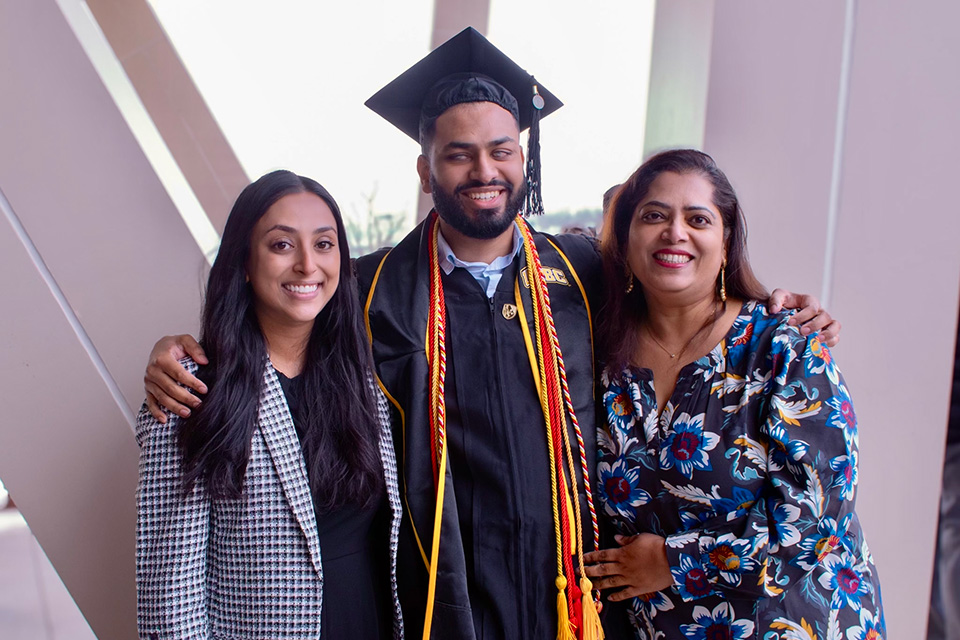Unseen Potential
Written By: Alena Abraham, fourth-year student pharmacist
Featured image (left to right): Alena, Shawn, and Sherly Abraham
In 2023, I created a podcast called Unseen Potential, which aims to raise awareness of and advocate for the blind and visually impaired community. My inspiration for beginning this podcast comes from my brother Shawn, who lost his vision during childhood. As we pursued our careers, I noticed significant differences in the resources and opportunities available to me, a sighted person, compared to those accessible to him.
In Unseen Potential, I promote insights and firsthand experiences that highlight the systemic challenges faced by the blind and visually impaired community in accessing education and career development. My goal is to expand the scope of the podcast to include guests with other disabilities and use this platform to advocate for greater accessibility and inclusion in workplaces, schools, public spaces, and technologies. Ultimately, I want to facilitate discussions that empower the disabled community and gather public support for creating a more inclusive society for all.
As a second-generation Indian immigrant growing up in America with a blind brother, I have a personal experience with issues of diversity, equity, inclusion, and accessibility. My mother often shared stories about how fortunate we were compared to disabled individuals in other parts of the world who were excluded from mainstream society. These stories, combined with my brother’s experiences navigating vision loss, instilled in me a passion for disability rights and accessibility from a young age.
One of my guests, Emily Schlenker, a pharmacy student at the University of Kansas School of Pharmacy, shared her experience overcoming barriers that people doubted she could achieve as a blind student. She proved them wrong by successfully mixing IVs, administering vaccines, and verifying prescriptions. However, she faced some challenges along the way, such as accessing large volumes of course materials in alternate formats like braille and experiencing “access stress” when information was not provided to her in a usable format due to delays, errors, or lack of accessibility. Despite these challenges, she is excelling in pharmacy school and is interested in pursuing a career serving veterans in the VA health care system.
Another guest, Kunyeul Lee, a student at the University of Southern California, talked about his experience living in South Korea as a blind person where there are very limited career options. A law there only allowed blind people to legally work as a certain type of massage therapist. His parents fiercely advocated for him and immigrated to the US. Although he had struggles, he is now successfully graduating and obtained an internship at SAS Institute, a software company, where he will be working in accessibility testing.
I have seen firsthand how systemic barriers and biases can limit opportunities for communities that have been marginalized or living with disabilities. Through these experiences, I have learned that creating accessible spaces, technologies, and policies that empower people with disabilities requires more than just physical accommodations – it requires actively working towards breaking down social stigmas and ensuring that the voices of the disability community are included.
My personal connections to disability rights issues have shaped my perspective and motivated me to leverage my privilege and platforms to drive change toward inclusion. While we have made progress as a society, there is still much work needed to achieve equality and accessibility for all.
Thankfully, I attend a school that is making progress in areas of equity, diversity, and inclusion (EDI). Through initiatives such as the Paul A. Pumpian Memorial Lecture Series, the University of Maryland School of Pharmacy (UMSOP) aims to advance EDI in the pharmaceutical industry and clinical trials by centering patient perspectives in drug development and promoting representative research practices.
Additionally, UMSOP’s anti-racism and anti-oppression programming, as well as the School’s updated Office of EDI website, demonstrate focused attention on fostering a just, equitable, and supportive environment for historically excluded groups.
In my career, I aspire to advocate for increased clinical trial diversity and braille labeling initiatives to make health care research and information more inclusive and accessible for blind, disabled, and underrepresented patient populations. By influencing policy change across regulatory systems worldwide, I hope to empower people with disabilities through improved workplace accommodations, increased autonomy, and opportunities to contribute to emerging treatments. My goal is to bring about significant change in society by empowering individuals with disabilities to express themselves freely and demonstrate that their disabilities do not diminish their worth.


The podcast is incredibly inspiring!
This is so inspiring!! Great article!
So proud of you Alena. This is great! You’ve blossomed into an amazing, articulate, accomplished woman, and I’m so proud to call you family.
Very good article, Congratulations to the Author.
I got goosebumps and teared up reading through the blog, as a mom who watched my two daughters who went through and still going through all the struggles and obstacles as they try to move forward in the society as visually impaired individuals. Keep doing what you do Alena. Proud of you❤️